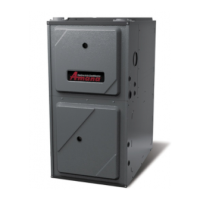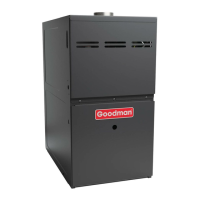SYSTEM OPERATION
22
Before placing unit in operation, leak test the unit and gas
connections.
WARNING
AVID E PSSILI EXPLSIN R IRE NEVER SE A MAC
R PEN LAME ES R LEAKS
Check for leaks using an approved chloride-free soap and
water solution, an electronic combustible gas detector, or
other approved testing methods.
Never exceed specied pressures for testing. Higher
pressure may damage the gas valve and cause subsequent
overring, resulting in heat exchanger failure. Disconnect
this unit and shuto valve from the gas supply piping system
before pressure testing the supply piping system with
pressures in excess of 1/2 psig (3.48 kPa). Isolate this unit
from the gas supply piping system by closing its external
manual gas shuto valve before pressure testing supply
piping system with test pressures equal to or less than 1/2
psig (3.48 kPa).
WARNING
P
RPANE GAS IS EAVIER AN AIR AND AN LEAKING GAS CAN SELE IN
AN LW AREAS R CNINED SPACES
PREVEN PRPER DAMAGE
PERSNAL INJR R DEA DE IRE R EXPLSIN CASED A
PRPANE GAS LEAK INSALL A GAS DEECIN WARNING DEVICE
A gas detecting warning system is the only reliable way to
detect a propane gas leak. Iron oxide (rust) can reduce the
level of odorant in propane gas. Do not rely on your sense of
smell. Contact a local propane gas supplier about installing
a gas detecting warning system. If the presence of gas is
suspected, follow the instructions on this page.
All propane gas equipment must conform to the safety
standards of the National Board of Fire Underwriters, NBFU
Manual 58.
For satisfactory operation, propane gas pressure must be
10 inch WC at the furnace manifold with all gas appli ances
in operation. Maintaining proper gas pressure depends on
three main factors:
1. Vaporization rate, depending on temperature of the liquid,
and “wetted surface” area of the con tainer or containers.
2. Proper pressure regulation. (Two-stage regulation is
recommended for both cost and eciency).
3. Pressure drop in lines between regulators, and between
second stage regulator and the appliance. Pipe size
will depend on length of pipe run and total load of all
appliances.
Complete information regarding tank sizing for vaporiza-
tion, recommended regulator settings, and pipe sizing is
available from most regulator manufacturers and propane
gas suppliers.
Use pipe dope approved for use with L.P. gas.
Refer to the following illustration for typical propane gas
installations and piping.
WARNING
I
E GAS RNACE IS INSALLED IN A ASEMEN AN EXCAVAED
ARE
A
R A CN
INED
SPACE
I
IS SRNGL
RECMMEN
DED
CNAC A PRPANE SPPLIER INSALL A GAS DEECING
WARNING DEVICE IN CASE
A GAS LEAK
•
S
IN
CE PRPANE GAS IS EA
VIER AN AIR AN LEAK
ING GAS CAN
SELE IN AN LW AREAS R CNINED SPACES
•
P
RPANE GAS DRAN MA ADE MAKING E GAS NDEECALE
EXCEP WI A WARNING DEVICE

